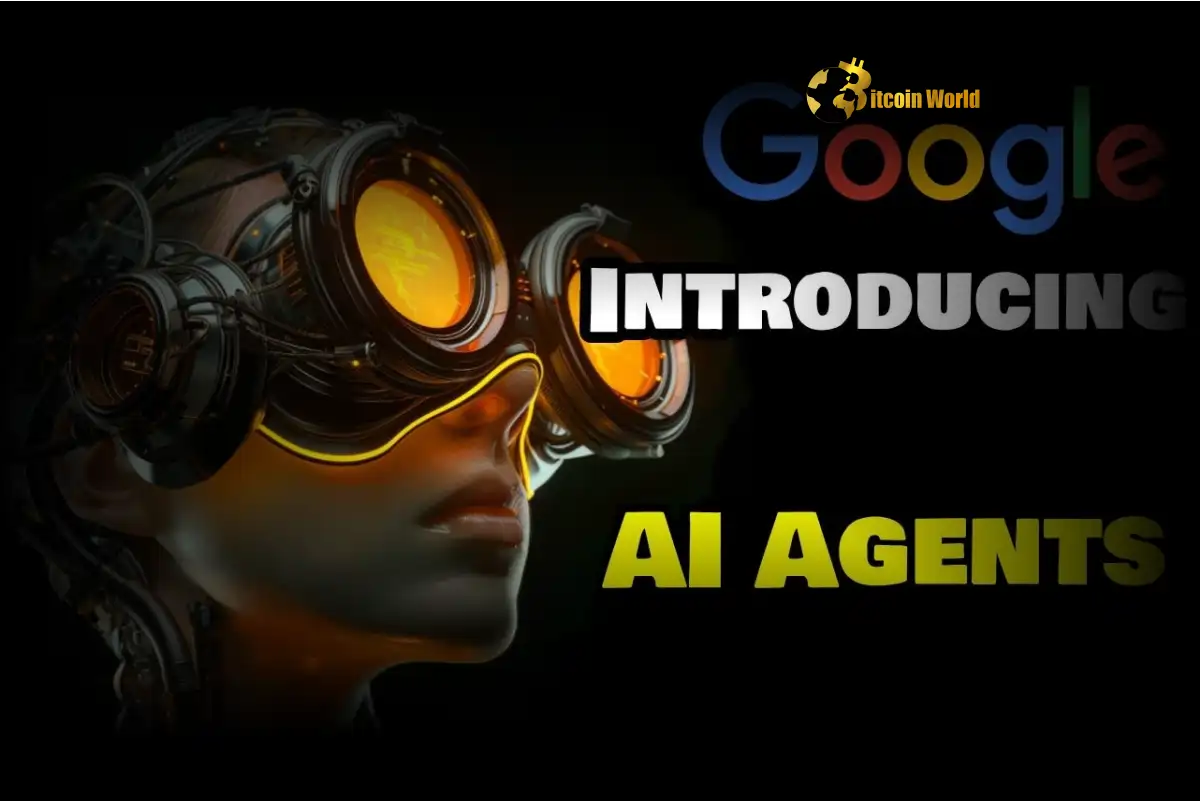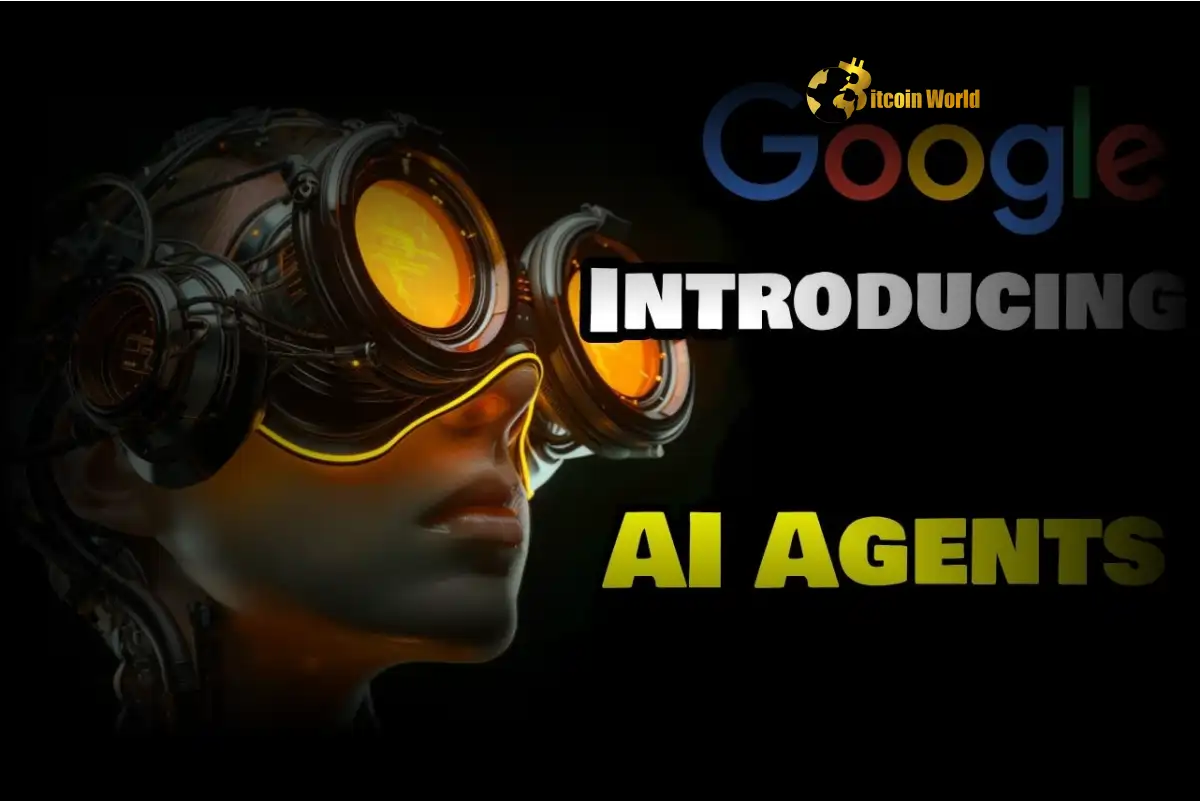BitcoinWorld

Google AI Agents: A Revolutionary Shift in the Future of Search
For decades, Google has been the primary gateway to the internet, offering users a list of links based on complex algorithms. This model has been foundational to the digital economy and how we access information. However, the digital landscape is constantly evolving, and at I/O 2025, Google signaled a dramatic departure from this familiar paradigm. The era of simply providing links is giving way to a new world where Google AI Agents will act as intelligent intermediaries, fundamentally changing the Future of Search.
What Are Google AI Agents and How Will They Change How We Find Information?
Forget scrolling through pages of blue links. Google’s new vision, heavily showcased at Google I/O 2025, centers around AI agents that proactively fetch, process, and present information tailored to your needs. Google CEO Sundar Pichai and his team presented a series of these agents designed to bring you the web in entirely new ways. As Liz Reid, Google’s VP of Search, put it, this is a chapter where you can truly ask anything, from simple questions to complex research needs.
Several key AI agent initiatives were highlighted:
- AI Mode for All: Now available to every Search user in the United States, this feature provides a button to interact with an AI agent. Users can converse with the agent, ask it to visit web pages, summarize content in various ways, or even assist with shopping tasks.
- Project Mariner: Aimed at Ultra users, this is a more autonomous agent capable of handling up to 10 tasks simultaneously. It can navigate and interact with web pages in the background while the user focuses on other activities.
- Deep Research Agent: This agent specializes in generating comprehensive research reports by visiting numerous relevant websites. It’s becoming more personalized and can connect with your Gmail and Drive accounts for deeper context.
- Project Astra Integration: Google’s real-time, multimodal AI experience is being woven into Search and Gemini, allowing users to interact with an AI agent verbally and even show it what they see through their device’s camera.
These developments underscore Google’s commitment to transforming Search from a directory into a personalized, intelligent assistant.
The Revolutionary Shift Unveiled at Google I/O 2025
The push towards AI agents isn’t a sudden whim; it’s a response to the rapid advancements in AI, particularly the rise of large language models like ChatGPT. Google acknowledged this ‘AI reckoning,’ which began influencing their strategy at the previous year’s I/O with the introduction of AI Overviews. While the initial rollout of AI Overviews faced criticism due to hallucinations, Google’s presentation at I/O 2025 demonstrated a more refined and ambitious plan for integrating AI deeply into the user experience. The message was clear: AI is not just an add-on; it is the core of the new Future of Search.
Exploring the AI Agent Web: Building the Foundation
This shift towards AI agents isn’t just about user-facing features; it also requires significant underlying infrastructure. Google is actively working on the ‘plumbing’ that will allow these agents to operate effectively across the internet. A key announcement was that the SDK for Gemini models will now natively support Anthropic’s MCP (Machine Communication Protocol), an emerging standard designed to help agents connect and interact with data sources on the web.
Google isn’t alone in envisioning this future. Microsoft CTO Kevin Scott has also spoken about an ‘open agentic web,’ where agents perform actions on users’ behalf. Scott highlighted the need for protocols connecting agents to data sources and each other, specifically mentioning Google’s Agent2Agent protocol alongside Anthropic’s MCP as crucial components for building this AI Agent Web.
Significant Challenges: How AI and Publishers Clash in the New Model
While the concept of AI agents promises efficiency and convenience for users, it introduces substantial challenges, particularly for the existing web ecosystem. Ben Thompson of Stratechery points out a major conflict: if AI agents visit websites and summarize content instead of directing human users, it could severely disrupt the ad-supported business model that underpins much of the internet, especially for publishers.
The impact varies. Businesses selling goods or services directly online, like e-commerce platforms or ticketing sites, might benefit from agents acting as a new platform to reach customers. However, for news sites and content publishers, who rely on human traffic to view advertisements, AI summaries represent a direct threat to revenue. As one Google communications leader noted during I/O, “human attention is the only truly finite resource.” While AI agents aim to give users more time back, this efficiency could come at the cost of the very content creators that fuel the AI systems.
The Persistent Hallucination Hurdle for Google AI Agents
Beyond the economic impact, a critical technical challenge remains: the tendency of AI models to ‘hallucinate’ or generate incorrect information presented as fact. This issue was prominently highlighted during the initial AI Overviews rollout and remains a concern for Google AI Agents.
Even DeepMind CEO Demis Hassabis acknowledged the current limitations of AI consistency onstage at I/O. He noted that it’s relatively easy to find flaws in current AI chatbots, whether in solving basic math problems or playing simple games. Hassabis stated that for something to be considered true AGI (Artificial General Intelligence), it would need far greater consistency across a wide range of tasks.
Widespread hallucinations from AI agents could have serious consequences, potentially eroding user trust in online information and contributing to the spread of misinformation. This reliability gap is a significant hurdle that Google must continue to address as it rolls out these new systems.
Google’s Bold Path Forward
Despite the complex challenges surrounding the ad model and AI reliability, Google is clearly pushing ahead with its vision for AI agents. The company, which has played a central role in shaping the web for decades, is now reorienting its core function – bringing users information – around this new AI-centric paradigm. This shift, showcased prominently at Google I/O 2025, marks a potentially major turning point in the history of both Google and the internet itself, moving towards a future where AI agents are the primary navigators of the digital world.
To learn more about the latest AI news trends, explore our articles on key developments shaping AI models features.
This post Google AI Agents: A Revolutionary Shift in the Future of Search first appeared on BitcoinWorld and is written by Editorial Team





